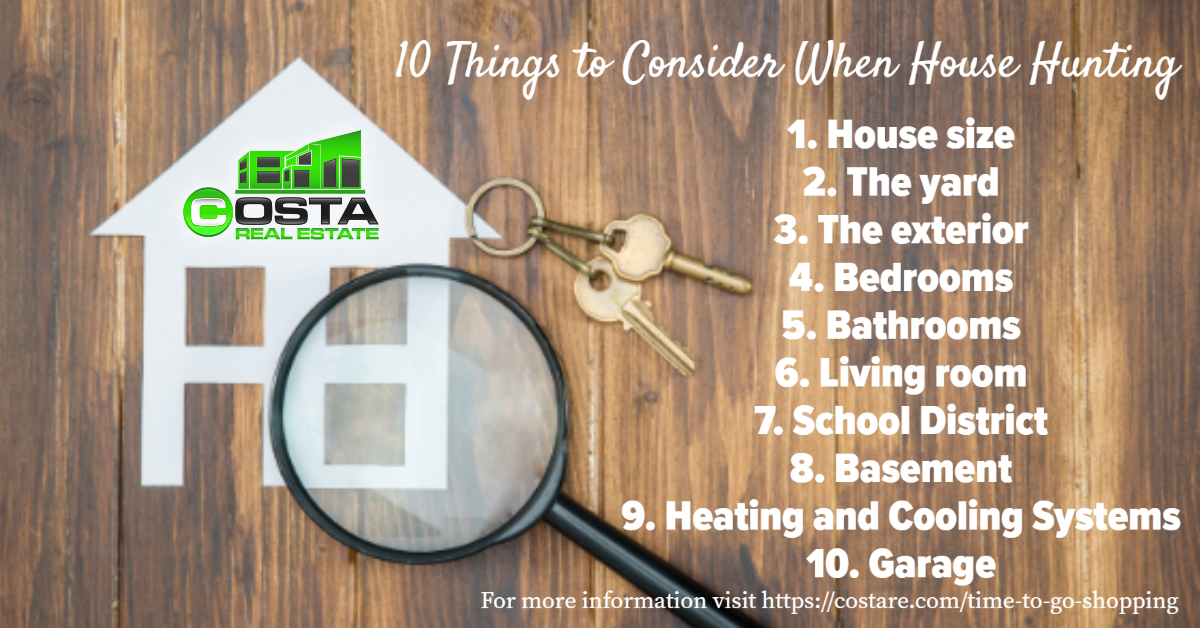Now that you have made the decision to buy a home, have secured your preapproval and finances, and have chosen the best agent for you, it's time to house shopping!
Top Ten Things to Consider When House Hunting
When looking for your home there are many things that you will want to take into consideration. Reference this list for some tips before you begin looking.
- House Size
- Make sure that the house that you are looking to buy has enough space for you and your family. Think about what your future will look like. Will you be starting a family soon or downsizing? These important factors play a huge role in how much space you will need.
- The yard
- Decide how much acreage you are looking for before you go home shopping. Are you looking for a large amount of acreage with a lot of privacy? Do you need a large yard for animals and children to play in, or do you prefer to have a small yard that requires little to no maintenance?
- The Exterior
- Ensure that the exterior of the home is in good shape. Consider getting a home inspection and pay special attention to the roof, foundation, and siding.
- Bedrooms
- Consider not only the number of bedrooms, but if they meet your needs. Are the bedrooms large enough for what they are using them for? If you are using a bedroom for an office or a playroom, is there enough space? Is the lighting enough? Do you have adequate access to outlets or natural lighting?
- Bathrooms
- Take note of the bathrooms and make sure that the plumbing is in working condition. Flush the toilets, turn the sinks on, and look for mold.
- Living room
- Make sure that the houses you are looking at purchasing have a living area that fits your personality. Is there space for your furniture? Do you like the layout of the room and could you see yourself relaxing and being comfortable there? Don't get hung up on things like furniture and paint, those things can be easily replaced.
- School District
- The school district that you are homebuying in is incredibly important. Some school districts are in high demand due to the high ratings of the school. Even if you do not have children, it's good to be aware of the school district information that you know if you will receive a higher value when you are ready to sell your home.
- Basement
- Know if the basement is finished or unfinished. If it is unfinished, are you prepared to put extra time and money into remodeling your basement or are you fine using it as an unfinished area? Be on the look out for any water damage, mold, or musty smells that could be troubling.
- Heating and Cooling Systems
- Be aware of the heating and cooling systems in the house. Is the home heated by electricity or gas? Is there a wood burner? What is the cooling system? Is there central air conditioning or window units? What will your utility bills look like?
- Garage
- Is a garage a necessity? If so what will you be using it for? Will you be parking your cars there or using it for storage space and organization? Know how much space you need before looking at homes.

Take a Drive
After taking these ten issues into consideration, it's time to take a drive. Before meeting with your realtor, drive around and look at the properties. If you aren't interested in the neighborhoods or the exterior of the home, you aren't going to be interested in the interior of the home. While driving around start to get a feel for what it would be like to own a property in the area. Start getting a sense of the properties available in those areas.
Narrow Your Search
Ask your real estate agent to set you up on a search so that you can be alerted when homes that meet your criteria become available. Select a few properties that interest you the most and have your real estate agent make appointments to visit them. Your agent will then take your to tour these properties and you can decide if this is the right home for you. During your tour, make sure to ask your real estate agent about the potential long term resale value of the properties you are considering.
Time to Buy
Once you have picked out the property you want to purchase, your real estate agent can help you make an offer that the seller will accept. A good agent will investigate the potential costs and expenses associated with the new property. An agent can also help you draft your offer in a way that gives you the advantage over another offer.